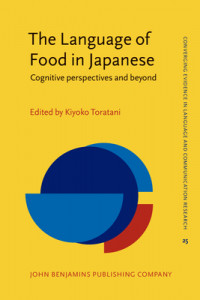The Language of Food in Japanese: Cognitive perspectives and beyond

Many studies on the language of food examine English or adopt discourse analysis. This volume makes a fresh attempt to analyze Japanese, focusing on non-discursive units. It offers state-of-the-art data-oriented studies, including methods of analysis in line with Cognitive Linguistics. It orchestrates relatable and intriguing topics, from sound-symbolism in rice cracker naming to meanings of aesthetic sake taste terms. The chapters show that the language of food in Japanese is multifaceted: for instance, expressivity is enhanced by ideophones, as sensory words iconically depicting perceptual experiences and as nuanced words flexibly participating in neologization; context-sensitivity is exemplified by words deeply imbued with socio-cultural constructs; creativity is portrayed by imaginative expressions grounded in embodied experience. The volume will be a valuable resource for students and researchers, not only in linguistics but also in neighboring disciplines, who seek deeper insights into how language interacts with food in Japanese or any other language.
Year of book publication: 2022Publisher website
Author: Kiyoko Toratani
